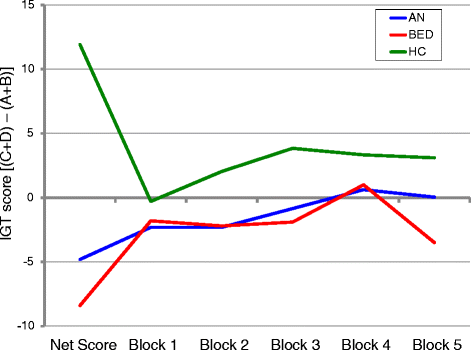Decision making, central coherence and set-shifting: a comparison between Binge Eating Disorder, Anorexia Nervosa and Healthy Controls
- PMID: 25616812
- PMCID: PMC4308856
- DOI: 10.1186/s12888-015-0395-z
Decision making, central coherence and set-shifting: a comparison between Binge Eating Disorder, Anorexia Nervosa and Healthy Controls
Abstract
Background: Several studies have investigated the cognitive profile in patients with Anorexia Nervosa (AN) and Bulimia Nervosa (BN); on the contrary few studies have evaluated it in patients with Binge Eating Disorder (BED). The purpose of this study was to compare decision making, central coherence and set-shifting between BED and AN patients.
Methods: A battery of neuropsychological tests including the Iowa Gambling Task (IGT), the Rey-Osterrieth Complex Figure Test (RCFT), the Wisconsin Card Sorting Test (WCST), the Trial Making Task (TMT) and the Hayling Sentence Completion Task (HSCT) were administered in a sample of 135 women (45 AN, 45 BED, 45 Healthy Controls [HC]). Furthermore, Beck Depression Inventory (BDI) was administered to evaluate depressive symptoms. Years of education, age, Body Mass Index (BMI) and depression severity were considered as covariates in statistical analyses.
Results: BED and AN patients showed high rates of cognitive impairment compared to HC on the domains investigated; furthermore, the cognitive profile of BED patients was characterised by poorer decision making and cognitive flexibility compared to patients with AN. Cognitive performance was strongly associated with depressive symptoms.
Conclusions: In the present sample, two different neurocognitive profiles emerged: a strong cognitive rigidity and a central coherence based on the details was predominant in patients with AN, while a lack of attention and difficulty in adapting to changes in a new situation seemed to better describe patients with BED. The knowledge of the different cognitive profiles of EDs patients may be important for the planning their psychotherapeutic intervention.
Figures

References
Publication types
MeSH terms
LinkOut - more resources
Full Text Sources
Other Literature Sources

